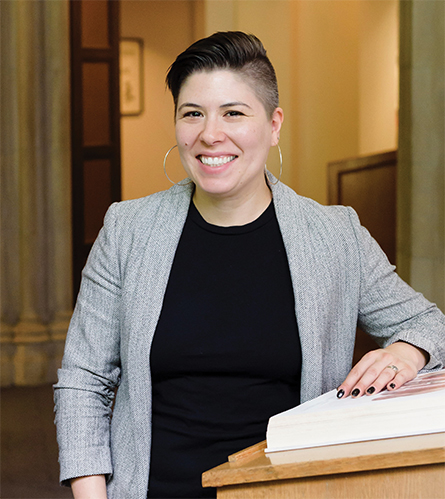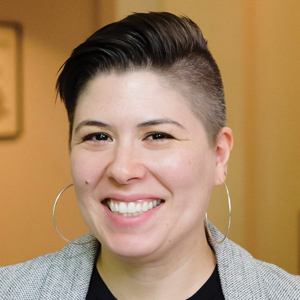A year of unrest and grace — reflections on my journey to tenure
After five years in my tenure-track appointment, I am now preparing my tenure packet. What does this entail? It is a synthesis of all of my course teaching, a chronological account of my research program progress, and a recounting of my service to college and community into a very long document.

The readers of this document will be colleagues, select former students and external reviewers, who may or may not know me personally, at other comparable academic institutions. Likely for the first time, my busy peers will have a chance not only to see what I have been up to as an assistant professor at beautiful Reed College but also, by way of letters of support or impartial reviews of the tenure packet, to give their measured opinion as to whether I should be granted tenure this fall.
These letters and reviews will be weighed carefully by a panel of Reed professors who were elected to our institution’s Committee for Advancement and Tenure. Late this coming fall, the committee will send a decision to our college president and me. Getting a negative tenure decision isn’t the end of the world — often, it just means that a professor would be happier at another institution, and it can open exciting new doors. But that doesn’t make the process any less stressful, and of course I would be thrilled to get a positive decision.
So I am writing The Packet. But aside from writing, and doing personal and activist work surrounding the Black Lives Matter movement, I have been a little … lazy. Bright summer days spent hitting the “next episode” button on my remote until the light wanes outside my window. Sleeping in late. Playing Candy Crush until my eyes hurt. Eating my latchkey kid comfort foods like SpaghettiOs (with meatballs), barritas de piña and Kraft Mac & Cheese. I am lucky that my wife has an understanding and loving nature.
I think this laziness is part of just letting go for a minute. An unconscious stepping away from the constant productivity, investment, planning and achieving that has been my life for the past 17 years since getting that GED and embarking on the academic scientist track. As I write this painstakingly organized biography of my professional life, so many feelings bubble up and demand to be processed. It is hard to believe this moment has arrived. I have felt joy but also plenty of anxiety and hurt as I struggled to understand an academic world that many of my more privileged colleagues seem to navigate intuitively.
More than anything, I find myself making notes of what I would want to tell a new assistant professor starting on the tenure track — particularly a person from a marginalized group. So I’ll take a moment here to share some hard-earned techniques and tips that helped me find balance as a nontraditional person in academia embarking on the tenure journey.
The broadest bit of advice for a new hire is to practice self-compassion. Would we talk to a dear friend in the same way that we often negatively talk to ourselves? No! Incorporating self-compassion into my day-to-day life has reduced my feelings of inadequacy and anxiety dramatically and has allowed me to forgive myself in deep ways. I have just divulged to the entire ASBMB Today readership that I sometimes waste full days on Netflix and mega-refined carbohydrates. Most of us would cheer on a generally hard-working friend for doing the same thing and would encourage them in well-deserved indulgence. Why are we not as kind to ourselves?
The add-on to that is to consider employing vulnerability. When I speak my weaknesses and fears out loud to peers and students, the monster of self-doubt and fear often is vanquished. I also have become comfortable with inducing slight discomfort in more privileged colleagues when I point out something that I was not brought up with or a difference in how I see the academic world based on my ethnic, socioeconomic and cultural differences.
Many of my intelligent and talented colleagues attended prestigious high schools and universities. Many automatically were enrolled in college preparation workshops and SAT prep courses in high school and were introduced to social networks that helped guide them to success. This was not my academic experience, and I sometimes have to point that out gently, because I can feel isolated when my colleagues are relating to one another in my presence. This is uncomfortable to do, but as a light-skinned Mexican American, I can and do use the problematic privilege of my lighter skin color to speak truth to power more easily and vulnerably. This allows folks that may not have that particular privilege to do more important things with their time. It also allows me to feel truly seen in the academy as an intersectional, multifaceted human.
The above suggestions are broad. But no one told me about the day-to-day, often emotionally overwhelming grind of being a new underrepresented minority assistant professor on the tenure track.
When I began my professional appointment, I was completely unprepared for teaching: how to structure a course, how to write tests (it’s so hard), how to know if what I was doing engaged students and worked as it should. It seemed like everyone else had been a great teacher since birth. What I’ve learned since is just how personal teaching is and that a course doesn’t gel until around the third time you teach it.
So my advice for beginners is to stick to the main things you think a person taking your course should come away with and to believe in yourself. Trying to mimic a more experienced teacher will add hours to your workweek and may not engage students in the way that your own vision will. That said, if someone shares their amazing materials and says you can do whatever you want with them? Save your energy and shamelessly use those materials all you want. There is no reason to reinvent an introductory chemistry or biology course if you don’t want to.
The above goes for establishing your research lab. Keep things simple, and do it your way. You are an experimentalist, so use that same approach in managing your lab members and your projects. My only other suggestion is to walk through your lab once a day, even if only to water a plant or dust your own lab bench. Why? Because it reminds you that even if you aren’t making all the research progress you’d like, you are still doing this. You finally have your very own research lab. Be proud. Also, it doesn’t hurt for your students to know you might pop in at any time.
Next is the unspoken norm that you should always be available and always say yes, particularly if you are an underrepresented minority. Many of us have learned that the occasional “I regretfully decline” response is important. So why don’t you reclaim some of that “no” time just for you? You deserve and have earned the right to have lunch or an afternoon cup of coffee alone for 20 or 30 minutes in your office with the door closed. Every single day. Do not apologize or explain. Just close the door and eat your reheated pasta. Maybe even click Buzzfeed open or watch a short episode of your current favorite show. If the knocking of students or colleagues persists, put a note on your door, or you can escape to a less used building or a pleasant spot outside.
Finally, it is essential to have a constantly maintained, your-own-eyes-only CV (academic resumé) that documents every single little bit of outreach, service, informal talks, minor honors or awards, and in-person or virtual panels that you have done. Look at it when you feel you aren’t doing all that you could. You are doing so much, and it adds up. And the magical part is that when it is finally time to write up your tenure packet, you have everything in one place, and you won’t forget anything of value. I am grateful that I started and kept up such a document
In this journey toward applying for tenure, it became clear to me that there is no one true way to accomplish anything in this world. It’s not OK for anyone to make us feel weird or wrong for doing what comes most easily to us — being ourselves and doing things in our own unique way. As underrepresented minorities, we can be all of the things, and we enrich our academic environment with our unique lens and approach.
I hope you will be faithful to your own light — and in the meantime, allow yourself a few lazy, snack-filled days.
Enjoy reading ASBMB Today?
Become a member to receive the print edition four times a year and the digital edition monthly.
Learn moreFeatured jobs
from the ASBMB career center
Get the latest from ASBMB Today
Enter your email address, and we’ll send you a weekly email with recent articles, interviews and more.
Latest in Careers
Careers highlights or most popular articles

From humble beginnings to unlocking lysosomal secrets
Monther Abu–Remaileh will receive the ASBMB’s 2026 Walter A. Shaw Young Investigator Award in Lipid Research at the ASBMB Annual Meeting, March 7-10 in Washington, D.C.

Chemistry meets biology to thwart parasites
Margaret Phillips will receive the Alice and C. C. Wang Award in Molecular Parasitology at the ASBMB Annual Meeting, March 7-10 in Washington, D.C.

Decoding how bacteria flip host’s molecular switches
Kim Orth will receive the Earl and Thressa Stadtman Distinguished Scientists Award at the ASBMB Annual Meeting, March 7–10, just outside of Washington, D.C.

Defining JNKs: Targets for drug discovery
Roger Davis will receive the Bert and Natalie Vallee Award in Biomedical Science at the ASBMB Annual Meeting, March 7–10, just outside of Washington, D.C.

Upcoming opportunities
No matter where you are in your career and what future path you aspire to, everyone needs leadership skills. Join ASBMB for practical strategies for building and practicing leadership skills.

Close out ASBMB 2026 with a bang
The closing reception of the 2026 ASBMB Annual Meeting will be held at the Torpedo Factory Art Center in Alexandra, Virginia.

